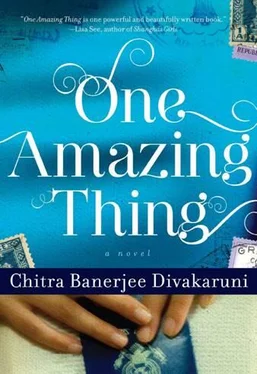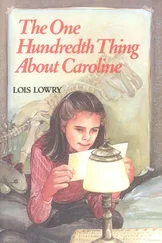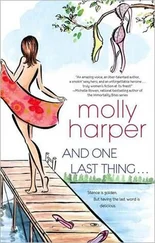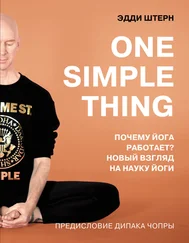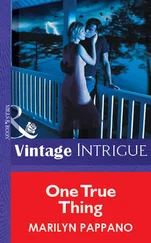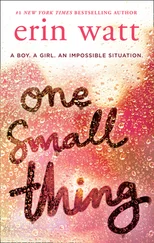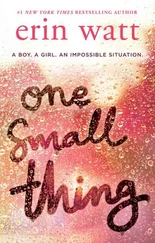In America, they moved from city to city until Mr. Chan was forced to accept the fact that his dentist’s degree was worthless here. Finally, they sold Jiang’s jewelry and bought a small grocery in a Chinatown. Jiang helped in the store, dividing her attention between the customers and the babies-one, then two, in the playpen in the tiny back room. She was so good at managing the business that by the time the babies grew into children, the store had expanded into a supermarket and the Chans lived in a comfortable apartment above it. The family bought another supermarket and then a third; the children were sent to private schools; they moved to a large and lavish apartment in a gated building.
Everything Jiang required for daily life lay within the boundaries of Chinatown -markets, movie theaters, the houses of friends, the children’s schools. Was there another need? If so, she buried that hankering deep within herself. In this new, compacted existence, there was no necessity for her to speak English, so she let it go. And, along with the language she had once prided herself on speaking so well, she let go of that portion of her past where English had played an important part. By the time her grandchildren were born, she communicated only in Mandarin.
Sometimes in the evenings Mr. Lu, now a widower, visited Mr. Chan. Jiang served them tea and dim sum but never joined in their wistful reminiscences. Her brother, Vincent, having finally managed to locate her, paid them a visit from Australia, where after decades of hard work he had risen to be the manager of-ah, ironic world!-a shoe factory. She was happy to see him, if in a bemused kind of way. (This stooped, tobacco-chewing man with a shock of salt-and-pepper hair did not seem to her to be connected in any way to the young man she had left behind on the docks of Calcutta, dressed in a crisp white button-down shirt.) When he brought up their childhood, waxing poetic about the hidden mansion in which they were raised, she refused to indulge in nostalgia with him. Only fools chewed the cud of the past.
But something was dislodged inside her as she listened to her husband and her brother conversing. After Vincent left, she found herself sitting by her bedroom window, staring out. Instead of the busy streets of Chinatown she saw an enclosed courtyard, roses spilling over a stone bench, children running around a fountain, screaming with laughter. The moon rose, shaking her heart with its beauty. Her father recited poetry, and she mouthed the words along with him. Each day she could smell the mango trees more distinctly. Inside her, emptiness grew until she felt like a hollowed-out bamboo. So when Mr. Chan passed away and Vincent wrote that he was planning a trip to Calcutta to decide whether he wanted to retire there, she wrote back impulsively-surprising herself, because she had thought herself long done with impulsiveness-that she would meet him in the city of her youth.
“Why am I going?” Jiang said. She shrugged and spread her hands. “Not sure. End of story.”
In the silence that shimmered in the wake of Jiang’s story, each member of the company-for listening had made them into that-was busy with his or her thoughts. They went about their tasks, which had been assigned by Cameron or dictated by their bodies, but inside them the story still traveled, glowing and tumbling end over end, like a meteor in a slow-motion movie clip.
Malathi stirred a pan of Kool-Aid in the weakening light that Cameron had switched on-for only a few minutes, he warned-and thought of Jiang’s parting from her father. It pulled up uncomfortable memories of the last time she had seen her own family, outside the security gate at the airport in Chennai. They had forgiven her and traveled by train all the way from Coimbatore to say good-bye, although she had indicated that it was quite unnecessary. How embarrassed she had been by their garish clothing, their loud, provincial accents. Her mother’s teary hugs, her father’s admonitions to be a decent girl and keep out of trouble, her sisters’ lists of items they wanted from America -all of it had made her glad she was leaving. Now she would probably never see them again. With that realization, every item on the lists her sisters had compiled in their innocent greed (items she had pushed out of her mind even before she boarded the airplane) came back to haunt her: Hershey’s Kisses, bars of Dove soap, Revlon lipsticks, copies of Good Housekeeping and Glamour, and diaries with a little lock and key.
Then she thought of Mohit’s fickleness, typical of men. This made her so angry that she almost upset the pan of Kool-Aid.
Tariq had not moved from his seat, not even to raise his feet onto the rungs of the chair as Cameron had advised, although he could feel water seeping into his shoes. He, too, was thinking, his forehead scrunched from contemplation. He should have been checking his cell phone, but instead he considered the nature of governments. How they couldn’t be trusted. How they turned on you when you least expected it, when you had been a law-abiding, good-hearted citizen, and locked you up as though you were a criminal. Why would anyone want to live in a country that did that to their father?
Mangalam tried the office lines, but only half his mind registered that they were still dead. With the other half of his mind he was thinking about the passion with which the young Jiang had loved Mohit, a passion frozen into foreverness by the destiny that separated them. A passion that he suspected, by the tremor in the old woman’s voice, still existed. Jiang had cursed fate for separating them, but wasn’t she lucky, in a way? Had they married, at best their love would have been like the comfort of slipping one’s feet into a pair of old shoes. At worst, it would have been like his life. (Mangalam, too, had loved his wife in the beginning. He remembered the fact of that love, though not how it had felt. That memory was gone completely, like a computer file wiped out by a virus.) Love, when alive, is a garland, he thought. When dead, it’s a garotte. He felt rather pleased with himself for having come up with the metaphor. Lily and Uma were helping Cameron check the condition of the ceiling.
“Gramma really fooled us all these years, pretending she didn’t know what we were saying, forcing us to speak Mandarin!” Lily said as they slopped through the water to the storage area in the back. “And all those things that happened to her.” She whistled softly, eyes sparkling in the dim light. “Now I want to go with her to India and see that house.”
“I want to see that house, too,” Cameron said.
If people could be compared to houses, Uma thought, then Cameron was as secretive as Jiang’s former home. Who lived within his shuttered inner rooms? In the bleakness that Uma’s life had shrunk to, the mystery of Cameron gave her something to anticipate. Ramon, now-he would be a traditional Japanese home, walls built of rice paper so that light could shine through and reveal every silhouette. Perhaps that was what she had loved about him, his transparency. He never tried to hide anything, not even how much he cared for her.
But why was she thinking of him in the past tense?
Mrs. Pritchett had locked herself in the bathroom, though she didn’t need to use it. Jiang’s matter-of-fact voice, speaking of love crumpled up and thrown away like a letter with too many mistakes in it, of families blown like spores across the desert of the world, had calmed her and made her remember something that she needed to check on. She searched through the inner compartment of her purse and came up with a small Ziploc bag that she had secreted there weeks back, just in case. It held a few pills. Mrs. Pritchett congratulated herself on the superior intelligence with which she had foiled Mr. Pritchett. She considered taking a pill but decided she would save it for later. Right now, she had to think about the story.
Читать дальше
